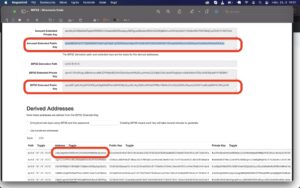You can find your private key using your recovery phrase, also known as passphrases using the below method.
What is a Private Key
- Cryptocurrency wallet consists of a set of public addresses and private keys. Anyone can deposit cryptocurrency in a public address, but funds cannot be removed from an address without the corresponding private key.
- A private key is a secret number similar to a password. In cryptocurrency, private keys are also used to sign transactions and prove ownership of a blockchain address.
- A private key is a secret number that is used in cryptocurrency and cryptography.
- Private keys represent final control and ownership of cryptocurrency. It is vitally important to prevent one’s private keys from being lost or compromised.
- A private key is an integral aspect of bitcoin and altcoins, and its security makeup helps to protect a user from theft and unauthorized access to funds.
- Private keys can take a few different forms. In ordinary, base-ten notation, a private key would be hundreds of digits long–so long that it would take years to crack a private key by brute force. For simplicity, private keys are usually expressed as a string of alphanumeric characters.
- A private key is a large, randomly-generated number with hundreds of digits. For simplicity, they are usually represented as strings of alphanumeric characters.
How Do Private Keys Work
A private key is an extremely large number that is used in cryptography, similar to a password. Private keys are used to create digital signatures that can easily be verified, without revealing the private key. Private keys are also used in cryptocurrency transactions in order to show ownership of a blockchain address.
Security Warning:
Never share your recovery phrase or private keys with anyone. Anyone who has access to that information can steal your funds without your permission. Handling plaintext private keys on an online device is unsafe unless you are extremely careful, and is not an operation you should be required to do with any kind of frequency.
How to find your crypto private keys
You can extract your keys by using Ian Coleman’s Recovery Tool. It runs locally in your browser and is fully open source. There is no sensitive information sent across the internet. If you want to be extra secure, it is strongly recommended to save the HTML file and run it on an offline device.
- Open bip39/. It is strongly recommended that you save the HTML file and run it on an offline device.
- Enter your recovery phrase into the ” BIP39 mnemonic” box.
- If you have used an extra BIP39 Passphrase, you should enter it in the “BIP39 Passphrase” box. Otherwise, leave it empty.
- Select the coin you want to view/export from the ‘Coin’ dropdown list.
- Scroll down to the ‘Derived Addresses’ section. Find your address and copy the private key that corresponds to it. If you are on a mobile device, you will need to scroll all the way to the right to see the corresponding private key.
Important notes:
- Be mindful of where you use the keys and how you transfer them from the page to the destined software. Malware in your system may be able to detect keys and steal your funds.
- The list of addresses is generated in the same order with the address used. You do not need to look through thousands of addresses (unless you have used thousands of addresses). For example, the third address that was used will be the third address on this list as well.
- If you sent coins out with that wallet, you may have “change” on change addresses. In the “Derivation Path” section set the value of “External/Internal” from 0 to 1 to list the change addresses.
- If your wallet is upgraded with segwit, on the Derivation Path section of the page select “BIP84” and “BIP49” to display the address starting with “b23”, “3bs” and 1bb respectively.
The Best Way to Store Private Keys
Private keys can be stored on computers or mobile phones, USB drives, a specialized hardware wallet, or even a piece of paper. The ideal form of storage will depend on how often you plan to use your cryptocurrency. A password-protected mobile phone or computer is the most convenient way to store cryptocurrency for everyday use. For long-term or “cold” storage, private keys should always be kept offline, ideally on devices that have never touched the internet. Even printers can be compromised. Hardware wallets can facilitate cold storage by signing transactions in a way that does not compromise the private keys.
Let us know in the comment section below if you find this helpful.
Don’t forget to subscribe to our YouTube Channel You can also find us on Twitter and Facebook.



